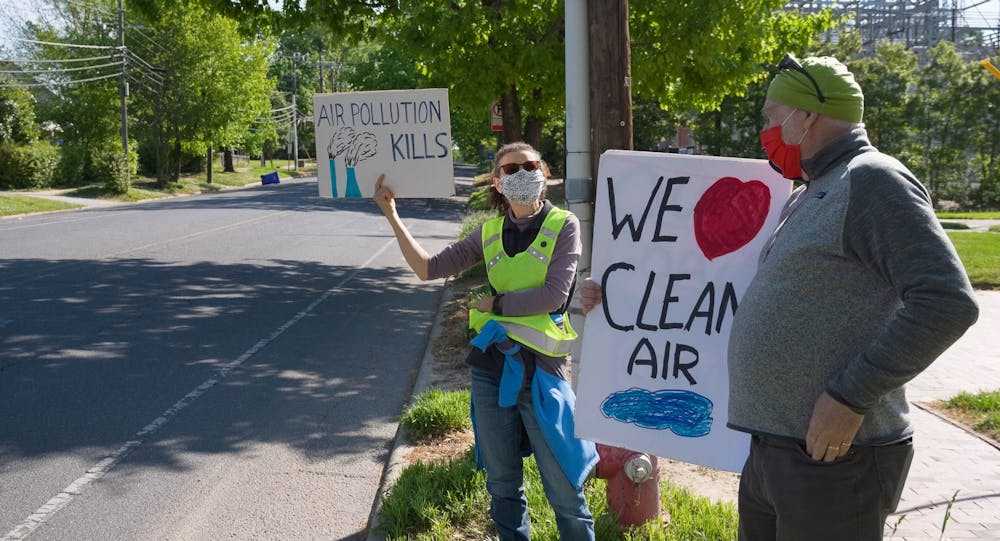UNC, however, views the heat input capacity as an identifiable descriptor of the boilers that burn coal — not as a limit on those boilers.
“The University has filed a motion for summary judgment asking the court to dismiss this lawsuit because the evidence does not support the plaintiff’s claims. The University has not exceeded any of the emissions limits in its permit,” the University said in a statement.
The University's new Climate Action Plan pledges to be carbon neutral by 2040 and begin to phase out the use of coal.
“The University remains committed to transitioning from coal use at the cogeneration facility and investing in renewable energy, as demonstrated by a 44.3 percent reduction in coal use from 2007 to 2019," Chief Sustainability Officer Mike Piehler said in a statement.
But in the new draft permit, the NC DAQ removed the heat input capacity from the Specific Limitations and Conditions section. The measure remains only in emission source description sections, and the change was not included in the Table of Changes section.
“The 323.17 (millions of British thermal units per hour) input rate is not a ‘limit’ and that rate remains in the draft permit in three places,” an NC DAQ representative wrote in a statement.
Heat input from the combustion of coal is a variable in the equations that limit sulfur dioxide and nitrogen dioxide emissions, which can cause lung disease, acid rain and harm to plant life.
Harlan from the Sierra Club questioned how the standards regulating these toxic emissions would be enforced without a measurable limit to use in the calculations.
“There would be nothing stopping UNC in the future from emitting fast, burning a lot more coal at a lot higher intensities, which creates even more toxic pollution all around UNC’s campus,” he said.
The NC DAQ, the state agency responsible for enforcing the rules it writes in plant permits, said that UNC’s plant must follow national standards for the allowed levels of pollutants in the air.
“The renewal of the permit does not decrease the ability of the NC DAQ to enforce the applicable permit conditions as they pertain to the permitted equipment,” the NC DAQ representative said.
News of the draft permit has spread to local residents and activists, who have been involved with ongoing activism against the coal plant for years.
To get the day's news and headlines in your inbox each morning, sign up for our email newsletters.
Community response
Gary Richards is a 73-year-old man who lives one block away from UNC’s coal plant. Every Friday morning for the last two years, he has stood outside the plant and protested against burning coal.
He said that UNC’s coal plant is a representation of everything that is wrong with the U.S. system: environmental injustice, climate change, air pollution and more.
Gary Richards said he’s written letters and submitted comments to the Environmental Protection Agency about the draft permit. But he said the “business as usual” standard of North Carolina state issues does not leave him feeling optimistic.
One day, he hopes UNC will close its coal plant.
“Whether I’ll live that long, I don’t know," Gary Richards said. "Doesn’t seem like they’re in any hurry to do it.”
Anna Richards, the former president of the Chapel Hill-Carrboro branch of the NAACP, also attended last Friday's protest.
She said that people in the historically and predominantly Black neighborhood of Pine Knolls have been hearing the University’s commitments to reduce coal use for years, referencing former-Chancellor Holden Thorp’s promise to close the plant by 2020.
“I think the people in power don’t see it as an issue that needs to be dealt with, and that’s sad to say, but I think that’s where we are in North Carolina," Anna Richards said.
Anna Richards said that she is involved with recruitment efforts to spread the word about the draft permit and campaign to strengthen it.
“I hope that’s something that people can really rally around and say, ‘No, there needs to be limits, and there needs to be a serious plan to say we’re gonna do something about this,'" Anna Richards said.
Elizabeth O’Nan, chairperson of Chapel Hill Organization for Clean Energy, is especially concerned about the effects this draft permit could have on people injured or disabled by chemicals.
“We're all more vulnerable, but we're certainly not disposable,” she said.
O’Nan and her daughter, now a senior at UNC, were disabled years ago by chlordane, a chemical used in pesticides that was taken off the market because of its acute and chronic health hazards.
“Things like somebody's perfume can drive my blood pressure up to serious levels,” she said. “And then, you know, the coal plant emissions are a serious threat to what's left of my health.”
O’Nan said she was unable to go to the protest last Friday for fear of worsening her health issues, but she continues to protest against UNC’s coal plant and the draft permit in other ways.
“It's going to be very important for the community to insist that they stop this. And we're hoping that at this public hearing for the permit, people will call in and write comments to do that: stop,” she said.
The draft permit is currently up for renewal and is in the public comment period. A virtual public hearing on the draft permit is scheduled for May 4 at 6 p.m. People can share their comments with the NC DAQ at DAQpubliccomments@ncdenr.gov with the subject line "UNC.15B" until May 6 at 5 p.m.
university@dailytarheel.com



